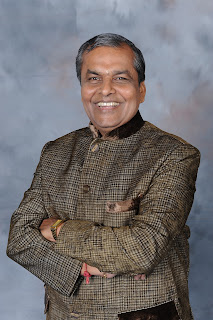Says
preacher Narendra Ramji Nandu at the at the annual festival of
Paryushan Parv at the Jain temple in
Mattancherry
By
Shevlin Sebastian
“If
you treat somebody badly, you are treating God badly,” says
Narendra Ramji Nandu during the annual festival of Paryushan
Parv at the Jain temple in Mattancherry.
“Suppose
you have a friend, who is fair-skinned. If he were to go into a coal
mine and then come out he will look black. But you know that he is
white inside. Whatever a man looks on the outside, inside he is God.
Remember that all human beings are white underneath. No doubt many do
wrong actions, yet there is something good in everybody.”
The
Mumbai-based Narendra is a preacher who, unlike a Jain monk, is
married and has a son. For the past forty years, he has been
traveling all over India preaching to people. But since 1998, he has
been spending long stretches of time giving talks to Jains living in
the USA and Europe.
In
his talks, he enunciates on the principles of Jainism. “The most
important concept is that of ahimsa or non-violence,” he says. “Do
not hurt a living being, be it a man, animal or insect.”
He
urges his fellow Jains to be truthful. “Be honest and do not steal
from anybody,” says Narendra. “Lead a simple life. And do not
forget the powerful impact of karma. Whatever incident takes place in
your life, it is because of actions done in the previous life. If you
do wrong in this life, you will suffer in your next life. If you do
good things there will be positive results.”
One
of the most remarkable aspects about Narendra is that he eats one
meal every second day. The rest of the time he survives on drinking
warm water between sunrise and sunset. 13 months of this tapasya is
called Varsithap. “For the past 16 years I am on Varsithap,” says
Narendra. “As a result, I have no health problems whatsoever.”
If
you eat less food, paradoxically, you get more energy, especially if
you learn to meditate at the same time. “When you meditate, the
energy is conserved,” says Narendra. When asked about the right
method, the preacher says, “Close your eyes and observe whatever
thoughts come to the mind. Do not get attached to them. Just remain
an observer. Over a period of time, you will notice that your mind
has become silent. Another way is to concentrate on the breath going
in and out. This will also help to silence the mind.”
It
is clear that this combination of very little food and meditation has
resulted in a tremendous energy radiating from Narendra. As
businessman Malay R. Chandaria says, “At 9 p.m. after a long day of
pujas and talks, he is as fresh as ever. In fact, Narendra Guru goes
to sleep only at 2 a.m. and is awake at 5 a.m.”
For
Dilip D Khona, the secretary of the Sri Cochin
Swetamber Jain Sangh (SCSJS), it is Narendra’s humility that
impresses him the most. “Apart from that, he is a spell-binding
speaker,” says Dilip.
In
his travels all over the world, Narendra has noticed that the Jains,
like people of all faiths, suffer from two major problems. One is
poor health, caused by the stresses of daily life. And the other is
money. “The lack of money is a problem,” says Narendra. “But
when a person has too much wealth, he has no peace of mind.”
For
the rich, he advocates sharing of the wealth. “This will create an
inner happiness and will enable them to lead a simple life,” he
says.
And,
of course, Narendra advocates the constant chanting of the Navkar
Mantra, the most powerful hymn in the Jain religion. It goes like
this:
Namō
arihantānam: I bow to the people who have gone before us
Namō
siddhānam: I bow to the fully liberated souls
Namō
āyariyānam: I bow to the spiritual leaders
Namō
uvajjhāyānam: I bow to the teachers
Namō
lōē savva sāhūnam: I bow to the monks
Says
Nitin J Javeri, the treasurer of the SCSJS: “When Narendra Guru
chants the Navkar mantra, there is a special energy in the hall. All
of us experience inner peace and tranquility.”
In
a world of endless conflicts and bloodshed, Narendra’s emphasis on
love and spirituality is a much needed balm.
(The New Indian Express, Kochi)


No comments:
Post a Comment